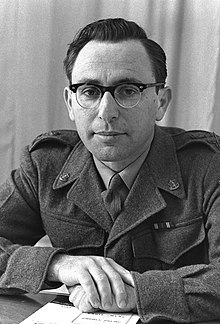Tzvi Tzur
| Tzvi Tzur | |
|---|---|

Tzvi Tzur in 1955
|
|
| Born | 1923 Zaslav, Soviet Union |
| Died | 28 December 2004 (aged 80–81) Israel |
| Allegiance |
British Army Haganah Israel Defense Forces |
| Years of service | 1936–1963 |
| Rank |
(Chief of Staff) |
| Battles/wars |
1948 Arab–Israeli War Suez Crisis |
| Tzvi Tzur | |
|---|---|
| Year of aliyah | 1925 |
| Knessets | 6 |
| Faction represented in Knesset | |
| 1965 | Rafi |
Tzvi Tzur (Hebrew: צבי צור, also transliterated Zvi Tsur, 1923 – 28 December 2004) was an Israeli officer who served as the IDF's 6th Chief of Staff.
Tzur was born in the Zaslav in the Soviet Union (now Iziaslav in Ukraine) in 1923 as Tsvi Tsera Tsertenko, and made aliyah to Mandatory Palestine at the age of two. In 1936, at the peak of the Arab revolt and the 1936–1939 pogroms he joined the Haganah in order to help protect the Jews from Arab rioters.
With the outbreak of the 1948 Arab-Israeli War, Tzur was appointed battalion leader in the Givati Brigade, and participated in Operation Pleshet, among others. Tzur was the founder of the fast jeep reconnaissance company, Samson's Foxes, which fought on the southern front. After the end of the war, he undertook organizing roles and went to study manpower management in the United States.
In 1956 he was promoted to the rank of Major General and was appointed as the commander of the central front. In 1958 he was appointed as deputy chief of staff and went for long period of study in France. He returned on September 1960. The following year he replaced Haim Laskov as the IDF chief of staff.
In January 1961 Tzur was appointed as the IDF Chief of Staff. One of his first actions was to appoint Major General Yitzhak Rabin as his deputy. Tzur's term was relatively quiet, except for border incidents with Syria, which shelled Israeli villages from the Golan Heights. The biggest IDF operation during Tzur's term was held on 16 March 1962, when the Golani Brigade raided Syrian outposts to the north of the Sea of Galilee in order to stop Syrian shelling. Seven Israeli soldiers and thirty Syrian soldiers were killed during the battle. However, the shelling was not stopped in the area and on 19 August 1963, Syrian forces murdered two civilians in Almagor.
...
Wikipedia
